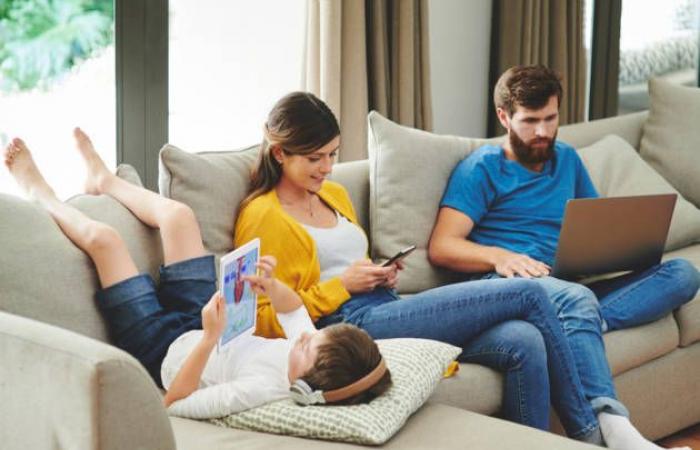The reality is alarming: young people spend 3 and a half hours per weekday with their noses glued to their cell phones and almost 5 hours per weekend day. These figures, from the 2022 James Report[1]only concern the smartphone. Added to this are the times spent in front of a computer, a console or a television. “This has certainly increased further in 2024. Among the 15-16 year olds that I coach, some admit to spending 7 and a half hours in front of a screen on Saturdays and Sundays,” explains Marc-André Müller, speaker at the École des parents from Geneva and coach for adolescents.
Hyperconnected adults too
Often singled out by adults, young people are by far not the only ones who stay online for too long. “After an eight-hour workday spent in front of a computer, some people still watch a series when they get home in the evening or relax by scrolling through videos on their phone. Sometimes, without realizing it, they total twelve hours of screen time per day! In other words, six months a year,” continues the specialist.
What could be more natural than sitting comfortably in front of a film to unwind? Is this necessarily problematic? Niels Weber, psychologist in Lausanne, specializing in hyperconnectivity, tempers: “The screen is always a means to achieve a goal. Heavy use does not necessarily mean discomfort. We must analyze what needs such a tool covers and look at the overall lifestyle of the person and those around them. A business manager who cannot disconnect once he arrives at home does not necessarily feel the need to do so, but it will compromise his family life. Is he anxious about letting go of his work? It’s exactly the same thing with a young girl who spends hours in front of TikTok. Why does she do it? What does that imply?”
Finding the reasons that push us to check the weather forecast five times a day or watch hours of videos of funny cats is a good way to analyze our consumption and modify it. “Digital tools are built to capture our attention without us realizing it. In themselves, they are neither good nor bad, unless we favor their use to the detriment of something else,” continues Niels Weber.
To avoid getting caught up in your screen, Marc-André Müller suggests analyzing what you do there for three consecutive days. “Once this observation is made, we can then decide what we want to stop or reduce. Everyone must choose the time they want to allocate to this tool and stick to it. The goal is to be a user and not a slave to your phone! A teen who wants to spend an hour sending videos can do so, but once those sixty minutes are over, they have to put the tool down and move on. It’s important to put a clear end to connection time without getting overwhelmed. The brain is then satisfied,” explains the coach.
Few rules, but clear and respected
As for young people, it is the responsibility of parents to set clear rules at home and enforce them while setting an example. “The injunction to disconnect can be very guilt-inducing. On the other hand, allowing yourself to not be reachable when you decide is profitable. Offering a disconnected family activity – for everyone – is a good way to spend time together. One piece of advice I often give is to announce that the disconnection will take place at a certain time and to set a timer. Thus, there will be an external stimulus which will capture attention and allow the tool to be turned off,” explains Niels Weber.
Finally, seniors are not spared from the call of the smartphone. “Digital interactions make it possible to compensate for the inability to see each other when an elderly person cannot move easily, but – we saw this clearly during Covid – they do not replace face-to-face,” concludes Niels Weber.
How to let go of your screen
– Don’t sleep with your phone: it’s better to invest in an alarm clock and leave the devices of all family members in a basket, in the living room for example.
– Do not eat with your phone: not only does this limit family interactions, but it encourages you to eat more, because the feeling of satiety is felt less quickly, the brain being occupied elsewhere.
– Establish a disconnection schedule in the evening for the whole family and delay the time when you pick up the phone again in the morning.
– Removing colors from the smartphone (this is easily done in the settings) makes the tool less attractive. To be tested as a family challenge: “Are we trying to last two days?”
– Choose fun activities with family or friends and don’t forget to move. The busier we are, the less time we spend looking at the social media news feed!
– As a parent: set an example and accept children’s “rearrangements” when you yourself deviate from family rules.
_____
To go further:
- Niels Weber, The screens, I manage!illustrations by Clémentine Latron, Magenta éd. 2023.
- “How to preserve your mental well-being in the face of the omnipresence of screens?”, Podcast “A Summer of Your Own”, RTS, 07/10/2024. Listen on: https://www.rts.ch/audio-podcast/2024/audio/comment-preserver-son-bien-etre-mental-face-al-omnipresence-des-ecrans-28565656.html
[1] https://www.zhaw.ch/storage/psychologie/upload/forschung/medienpsychologie/james/2018/Raport_JAMES_2022_fr.pdf






